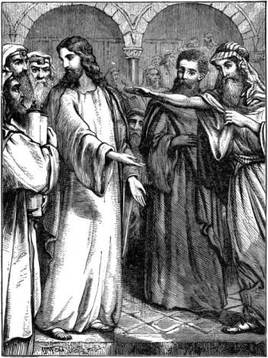
"Which of you shall convince Me of sin?" and adds,
"If I say the truth to you, why do you not believe Me? He that is of God, heareth the words of God; therefore you hear them not because you are not of God."
Yes, my dearly beloved young people, Jesus Christ could say with the fullest truth that He was without sin, for He is the immaculate Lamb, the spotless Lily, and Sanctity itself. He is God, Who cannot sin. It was a blasphemy to call Christ a sinner and companion of wicked people, when they knew from His public life that He was guilty of no wrongdoing, though they often accused Him of it. But Our Lord refutes these calumnies, and challenges His accusers to bring proof of their accusations: and on this day, so near His sacred Passion, He vindicates His whole life before them. Can we say the same thing of ourselves? With truth it can be said of us that we are sinners. St. John tells us in his Gospel: "If we say that we have no sin, we deceive ourselves, and the truth is not in us.''
Your own conscience tells you, my dear young friends, that often and often have you sinned. Many of you might say with truth that you have committed many sins and serious ones too. How was it that you fell into sin so easily? You never considered the heinousness of sin that was the reason; you considered sin so slight a matter, you even thought it an occasion to have a little fun, but as to the seriousness of it, you never gave it a thought. St. Augustine says that sin is the greatest of all evils, an infinite evil, the only evil. It is an infinite evil, because the offence is directed against God, who is infinite in His holiness. It is an insult to God. Do you know what it is to despise God, and insult God, and injure as far as lies in your power the infinite glory of the Creator of heaven and earth? The seriousness of an injury is estimated by the dignity of the person insulted.
Should you strike a companion in the face, you have done a bad act; if you slapped a minister of God's altar, you certainly see that your offence is greater; if you were bold enough to do it to a bishop, it wouId be more serious yet. If you should raise your hand to strike the Vicar of Christ on earth, the Pope, what horror for the act would not the whole world feel! But to offend God, who is infinitely superior in greatness to a bishop or a priest or the Holy Father, ought to be to our hearts a most abominable crime. God is that infinite Being who reigns in heaven, who has created all there is in heaven and on earth; He calls to the sea and it becomes calm. He who called the sun into existence, and who could blow it out again like the flame of a candle, is the all-powerful Lord, yet it is against Him that the sinner raises his hand. St. Bernard says, "Just think that an atom of a creature, an atom of dust so small and insignificant that without the aid of a microscope one would not know of its existence, rises in rebellion against this King of kings." Is it not great boldness in this nothingness to stand up against such power? You remember the fate of the devil; he, too, in his pride, revolted against his Maker,but what was he in the hands of God? powerful as God had made him and immortal, still God could easily hurl him into the abyss of hell. How terrible a thing it is to have God for our enemy! If we brought on ourselves the hatred of a king or any potentate, we would have to fear very much, lest he would do us a great deal of harm; we would be in constant dread of being thrown into prison. The anger of God is a great deal more to be dreaded; men can inflict on others punishments which are of short duration, and there is a limit to the pain which a man may endure. But God's punishment is everlasting, and the greatness of the pains which He can inflict is unlimited. When God grows tired of man's impudence, and the measure of his sins is filled. He flings him into the abyss of hell. We are told to fear Him who has the power of sending a soul to hell, for that is a dreadful affliction. Let us make a serious meditation on this, that to offend almighty God is a diabolical act of audacity. Not only do we offend and insult a good God when we commit a sin, but we sign ourselves over to the slavery of the devil, who comes to our soul and deprives it of all that is admirable; makes her a miserable, poor, despicable object, and takes away all her right to heaven. All the merits and good deeds are destroyed by a sin, the confessions, the holy communions, the works of charity, all are gone, and we stand before God without anything to recommend us. Suppose a gardener planted valuable fruit trees in his garden, and spent on them much time and money; they had borne excellent fruit for several years, but one night a heavy frost killed the trees and fruit. What would be the feeling of that man when he entered his garden and saw all the fruit lying on the ground, and the leaves of the trees black and blighted? He would be sorry enough to burst into tears and certainly into lamentations. Sin has done you more harm than this blighting frost. Has it not deprived you of that precious fruit which you are caring for so tenderly to bring to maturity, in order that you may by means of it gain heaven? The trees of virtue that bore such noble fruit have been ruthlessly torn up; what dreadful ruin, what chaos does not sin produce in the soul? Is it possible that a person can think lightly of such a misfortune? People may live months and years in those sins, and never think of the terrible state they are in. They do not see the condition of the soul, and consequently it gives them little concern. Father Segneri says, "If every time a person blasphemed, God would have his tongue swollen to such a degree that it would fill his mouth; if at every theft the hands would lose their power; if after an immodest act the whole body would be covered with a leprosy, think ye, there would be so many in this world addicted to such sin ? "But since the damage is done to the soul, we do not consider it very much.
Now, my dear young people, if you are in sin, are you going to remain so during these penitential days? Think with sorrow of your sins, and labor to eradicate them from your heart. Make a sincere, straightforward confession at Easter, and approach the table of the Lamb of God. Be not obstinate as so many are who cannot appreciate anything religious.
Our Lord did all that lay in His power to make the Jews understand that He was really the Messias; it was not for want of proof, or for the want of the grace, but instead of believing
they only blasphemed Him, and said He was possessed by the devil. This seems to be the picture of the world at the present time. Our Lord wants to illuminate the hearts and intellects of sinners, but they wish to remain in their ignorance. He wants to soften their hearts, but they will not let Him: it is not therefore through want of intellect nor of proof nor of the grace of God that these people will not change; it would almost require the miracle of a new creation to put other hearts in them. And He will not destroy our liberty, for human liberty is precious even to almighty God. What must be the feelings of those wretched parents who are so unhappy as to have wicked sons or daughters? When they advise their children to go to confession and Mass, to become respectable Christians, they receive a flat refusal, perhaps even an insult. I do not suppose that any of you have come to such an extreme; but we must all fear the first steps in sin. The first is never made alone, there come other steps afterward. Sin is like fire set to a house, the more it spreads the more it increases in heat and fury. Of course it is an old and trite saying, that a great fire may spring from a spark, which you could at one time have extinguished by setting your foot on it. I am intimately acquainted with a young man of my parish who in his youth was a charming example of innocence and happiness; he was much with me, and I enjoyed his boyish companionship very much. In course of time he became estranged, and I knew he had lost his innocence. I spoke to him, but all friendship was gone; he hated me, and avoided me as if I had done him some great wrong. Be on your guard, and let not sin into your heart; it is too horrible a thing to become familiar with. If you hate sin truly, and you really hear the voice of Jesus, open your heart to Him, and He will make you happy at Easter, and in fact at every one of your communions. Our Lord is happy to come to your soul; He will love everything in your simple dwelling as long as it is not sin; He will be pleased with the little sacrifices, the smallest preparations; He will see that you have a good will. He will not disdain your humble attempts at virtue. The mother who teaches the babe to talk says foolish words and repeats them over and over; she is teaching the child. Then prepare your heart for the coming of Our Lord at Easter, and He will truly say to you also,
"I will come in to him, and will sup with him, and he with Me." What an intimacy between Jesus and the soul! Who could refuse that loving friendship? With all my heart, Jesus! I cry to Thee," Yes, come, divine Jesus; come to my soul!"
Source: Sermons for Children's Masses, Imprimatur 1900
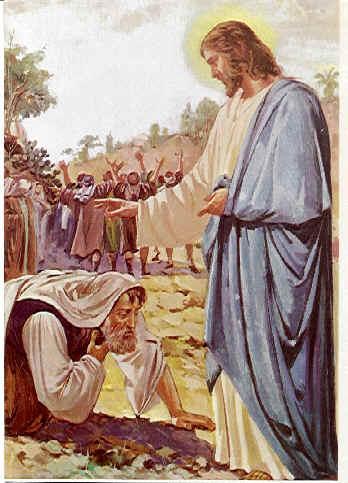
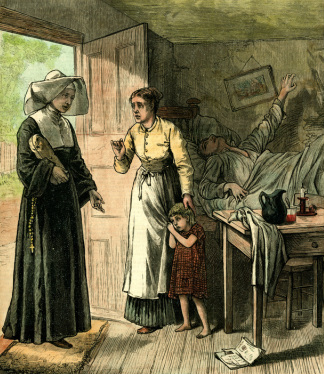
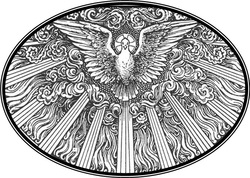
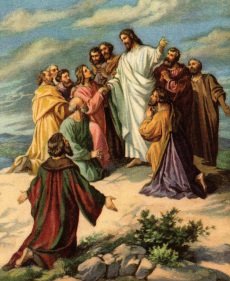

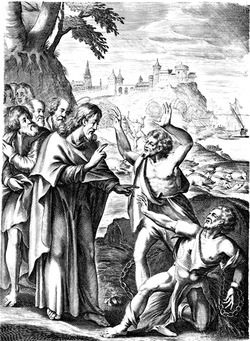
 RSS Feed
RSS Feed